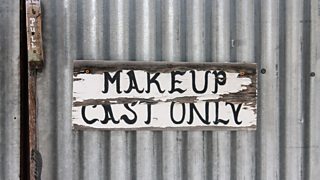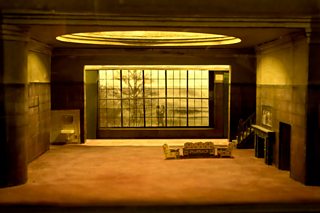Βι¶ΉΤΌΕΔ Writersroom London Voices Alumna, Benedict Lombe speaks about her experience in writing for theatre and how that has helped her develop her craft.
How has your experience of writing for theatre informed your writing for TV & Radio?
I think writing for theatre has given my voice a rhythm. I’ve discovered a musicality to how I write, which has been really fun to play with. Finding playfulness in the words and in the work has always been one of my favourite things. I remember when I first started writing, I would include jokes in the description of the action because I wanted that sense of 'play' to be embedded in how the script itself read. I think that holistic approach to capturing a tone, a feeling, a vibe on every level has helped in how I now craft stories for every medium, including film, TV and radio.
I have also found writing theatre to be an exercise in delivering polished work under serious time constraints. With my debut play , there was such a short period of time to deliver each draft - from the first to the final one, that I didn’t have as much time to second guess myself and wallow in despair. (This still happened, of course - just capped). What I learnt is that writing on instinct can be so useful. I had to be brutal about cuts - about what served the story and what didn’t. Every word, every beat, every line had intention. It's been a great training ground.

What is it like taking a piece of work from an idea right through to a live performance?
Deeply satisfying! And anxiety-inducing. And emotional. It’s the rollercoaster of writing a joke and waiting forever to hear whether it actually lands - after hearing it a million times in your head and then in rehearsals and then jumping from an unwavering belief in your work to wondering if you’re in the Bad Place where everything you touch is completely and utterly terrible. But there is nothing like the electricity of a live audience to remind you of all the reasons you created the work in the first place.
Particularly with - it’s a show that is absolutely aware of who’s in the room and uses it to tell the story without compromise or apology. And that was tricky - writing a show with the intention of recognising, celebrating and uplifting Black people, knowing that the reality of theatre is that most nights you are likely to be playing to a majority white - and often middle class - audience. It worked exactly because this reality was completely integrated into the story itself. And regardless of who was in the audience, on nights when we might have had several Black people in or none - everyone still leaves that space having witnessed a celebration of Blackness in its varied, beautiful and complex forms. Because we presented every single moment on our own terms. And I count that as a win.
What have you learnt from writing theatre that you think writers should be aware of, what do you wish you had known starting out?
When in doubt, always tell people how you feel! After you deliver your script, there will be so many creative, technical and promotional decisions that are made at lightning speed when it comes to bringing the show to life. Because everyone is working on borrowed time and there never seems to be enough of it. Make it clear to the theatre and to the director how involved you want to be. And you might not always know how involved you want to be until much later on - but you do have every right to be involved in the creative decisions, and I think many writers who are starting out might not realise this. Ask questions about the set, the lighting, the sound. Learn. Watching designers at work is a thing of beauty. You might not have much to contribute to early conversations about design and tech, but it helps to be in the room when they’re happening so you can have a full understanding of the process.
Be involved in the marketing - I can’t recommend this one enough. It’s so important that your story is framed the way you want it to be. Don’t ever just assume that it will be. Have a conversation with the marketing team as early as you can, so they understand your intentions, the tone you want to set and who you want to ensure there is space for in the room. Every play is unique, so “this is how we usually do it for our other shows” can’t always cut it. You have agency - and using it in the interest of presenting the truest articulation of your work on every level, in collaboration with everyone else working towards this goal - is something you owe to yourself.

What key craft skills do you think a screenwriter can take away from their work in theatre?
There are so many skills I’ve learnt from writing theatre that I’ve applied to screenwriting. A few that immediately come to mind would include:
1) Pacing
Theatre is so reliant on dialogue as it doesn’t have many of the other elements you get onscreen, but this forces you to get smart with how you tell the story and analyse what every step of the journey feels like to a watching audience. Any lag in the story is so jarringly obvious. So the ‘aliveness’ of theatre and that awareness of an audience has helped my screenplays flow by being able to recognise those dead moments earlier on.
2) Bun exposition
To quote that JP Saxe and Julia Michaels song “I know, you know, we know, we weren’t [buying that exposition] and it’s fine."
So use that to your advantage. If you really can’t find a way of weaving in all the necessary details without making anyone cringe at how bait the exposition is, then find a playful way to acknowledge what we all know is happening. And do it with flair. As far as I’m concerned, there’s always room for play.
3) No dream is too big
You can be as over the top with your vision as you want. As long you don’t lose the intimacy of human connection throughout the story. Often with theatre you are limited by budget, but never by imagination. This has made me more comfortable with exploring surrealism in screenplays and trying to root it in truth. It might not always work (not gonna lie, it might just be really, really, terrible sometimes) - but exploring it anyway will at least open up new opportunities for creative storytelling.
4) Feedback and edits
As many other writers have said, when you’re still in the process of writing and developing the script, how feedback is given and what you then do with that feedback is so important. The truth is that everyone will have an ideal version of the script they wish you were writing. So when you’re getting feedback - just take a beat to work out if the notes you’re being given derive from a place of understanding the version of the story you’re trying to tell. Otherwise you might end up compromising on your truth. New writers need to be told that their instincts are valid and so important. Everyone is ultimately working together to achieve the best version of the story you want to tell - so make sure your voice is being heard and understood all the way through the process.

This blog is part of a series of Theatre Takeovers. Over the next few months different new writing theatres will be sharing their knowledge and resources, to inspire future playwrights.
LAVA was developed by the .
